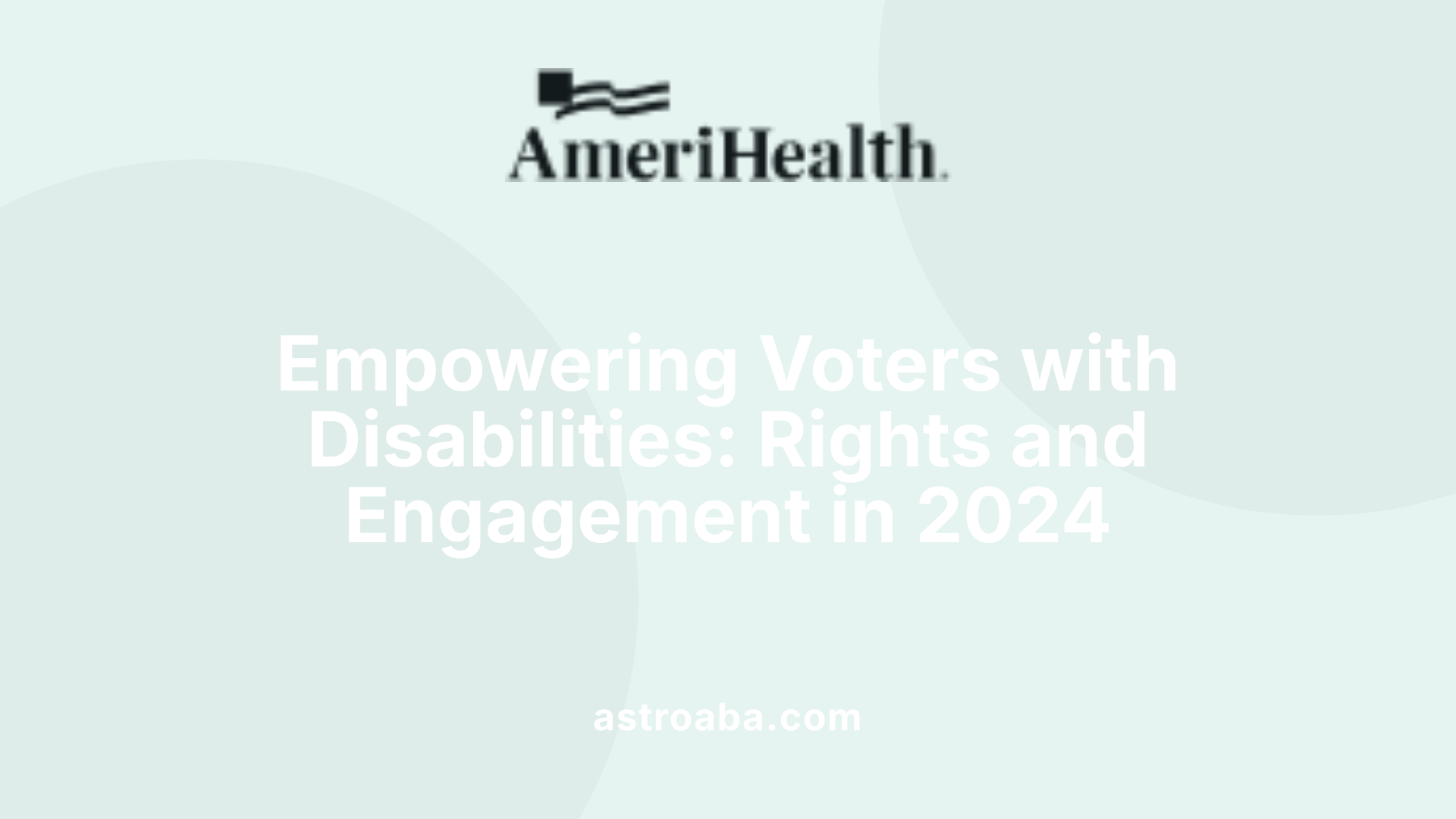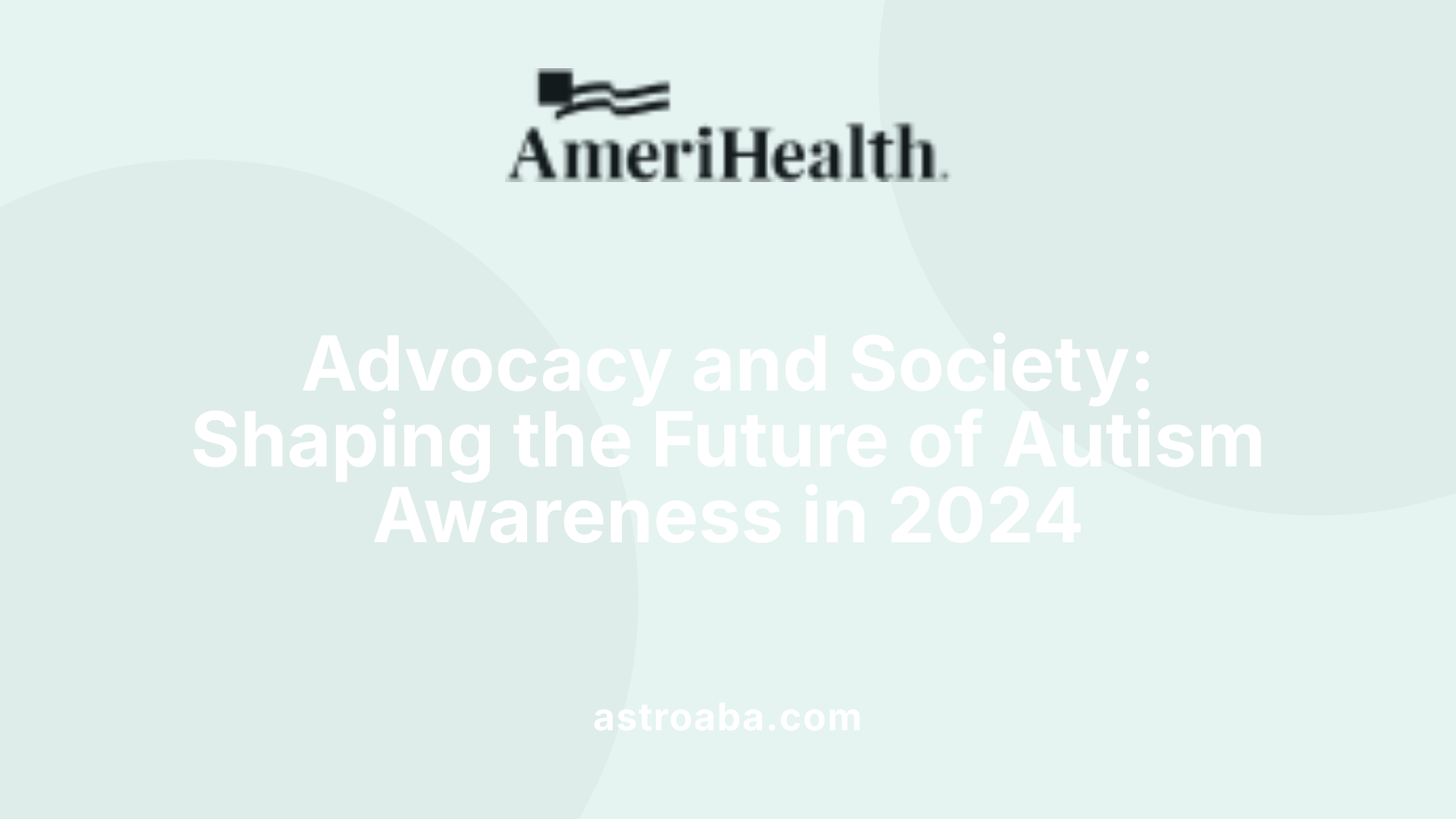Autism Moves to the Forefront of the 2024 Election
Autism Advocacy and Policy Take Center Stage in 2024 U.S. Elections

A Turning Point for Autism and Disability Rights in the Political Arena
As the 2024 U.S. presidential election approaches, autism and disability rights have emerged as pivotal issues shaping campaign discussions, policy proposals, and voter engagement. From legislative initiatives like the Autism CARES Act to debates over Medicaid and vaccine policies, the electoral landscape is increasingly centered on how the nation supports its neurodiverse population. This article explores the significance of autism in this election, the policy implications, candidate positions, and the societal conversations influencing the future of disability rights in America.
Autism Issues Amplified in Campaigns and Public Discourse

Why is autism a significant topic in the 2024 U.S. election?
Autism-related concerns have taken center stage in the 2024 presidential race, reflecting a broader societal shift towards inclusion and support for neurodiverse populations. Candidates are now addressing the need for targeted policies, such as increased funding for autism research and expanded access to healthcare services.
One notable initiative is the proposed 11-point autism plan, which emphasizes vital areas like conducting accurate census efforts to understand autism prevalence better, promoting early screening for timely intervention, and improving insurance coverage to lessen financial barriers for families. It also advocates for better support systems for adults with autism, recognizing the lifelong nature of the condition.
Beyond healthcare, there is a strong focus on voting rights and accessibility for people with autism and other neurodiversities. Discussions now include how to remove barriers that prevent equitable participation in elections, emphasizing that inclusive voting mechanisms are crucial for a fair democracy.
This increased attention is driven by research and advocacy groups challenging outdated stereotypes about autism. They promote understanding that autism severity varies widely and that neurodiverse individuals contribute uniquely to society.
Overall, autism is shaping policy debates and voter engagement strategies, making it a central issue that could influence legislative priorities and national conversations well past the election date.
Legislative Developments and Policy Changes in the Election Cycle
How might the 2024 election impact policies and legislation related to autism and disability rights?
The 2024 electoral outcome holds significant potential to shape the future of autism and disability-related policies in the United States. One major piece of legislation, the Autism CARES Act of 2024, has recently been passed in the House and aims to increase federal investment in autism research, healthcare initiatives, and data collection efforts. Its success and implementation heavily depend on the priorities of the incoming administration and Congress, which will influence funding levels and program development.
At the same time, there are competing proposals such as the so-called 'Project 2025.' This initiative has raised concerns among advocates because it suggests cuts to existing programs, diminishes protections, and could restrict access to vital services for individuals with autism and other disabilities. These policy shifts hinge on the legislative makeup and the political climate post-election.
Additionally, the election outcomes could determine the strength of nondiscrimination laws, healthcare protections like the Affordable Care Act, and the operational integrity of disability rights agencies. A more conservative government might pursue policy changes that could weaken safeguards, limit access to care, or alter support structures, whereas a more progressive government might work towards expanding and strengthening protections.
The overall impact of the election will largely depend on the platforms of the candidates, their influence within Congress, and their commitment to advancing inclusive policies. For disability advocates, this underscores the importance of active participation and advocacy during the election to ensure that the needs of neurodiverse and disabled populations are represented and protected.
| Legislation or Proposal | Current Status | Potential Impact | Notes |
|---|---|---|---|
| Autism CARES Act 2024 | Passed in House, awaiting Senate | Increased funding and research | Focuses on gaps and inclusion strategies |
| Project 2025 | Proposed policy | Possible funding cuts and restrictions | Opposed by many advocacy groups |
| ADA Protections | Under scrutiny | Possible weakening or reinforcement | Dependent on court and legislative actions |
Understanding this shifting landscape is vital for families, advocates, and policymakers aiming to secure a future where individuals with autism and disabilities receive comprehensive support and respect.
Candidate Positions and Misinformation on Autism and Vaccines
During the 2024 election cycle, political candidates have voiced a range of opinions about autism, vaccines, and neurodiversity, shaping public discourse on these complex issues.
Some candidates, notably former President Donald Trump, have expressed support for the controversial claims made by RFK Jr. regarding vaccines and autism. RFK Jr. has promoted the idea that vaccines might be linked to autism, despite overwhelming scientific evidence to the contrary. He has called for further investigations into vaccine safety, echoing misinformation that has been widely discredited by experts.
The scientific community and major health organizations like the CDC and WHO agree that vaccines are safe and effective. Extensive research shows no credible link between vaccines and autism. Vaccinations have been instrumental in reducing preventable diseases and saving millions of lives globally.
In contrast to the vaccine debates, discussions around neurodiversity during the election tend to emphasize support and inclusion for autistic individuals. Many advocates argue that autism should be recognized as a natural variation of human cognition rather than a condition that needs eradication. This perspective promotes acceptance and emphasizes the importance of societal accommodations.
The political landscape reflects a divide: while evidence-based health strategies hold strong with scientific consensus, misinformation continues to influence public opinions and policy discussions. Candidates' positions on these issues can significantly impact public health initiatives and the perception of autism and neurodiversity.
For voters and advocates, understanding the factual consensus versus misinformation is essential, especially in the context of legislation and public health policies that will shape the future of supports for autistic individuals and vaccine programs.
| Candidate | Position on Autism & Vaccines | Influence on Public Policy | Notes |
|---|---|---|---|
| Donald Trump | Supports investigation into vaccine-autism link; echoes claim by RFK Jr. | Possible skepticism of vaccine mandates | Misinformation-promoting stance |
| RFK Jr. | Claims vaccines may be linked to autism; demands investigation | Challenging established scientific consensus | Source of widespread misinformation |
| Scientific Community | No link between vaccines and autism; support for vaccination | Support for public health campaigns | Strong consensus based on extensive research |
| Neurodiversity Advocates | Autism as human variation; promotes inclusion | Policy support for acceptance and accommodations | Emphasis on societal change and respect |
Understanding these differing positions is crucial as the nation approaches an election that could significantly influence health policies and public perceptions around autism and vaccines.
Disability Rights and Voter Engagement in the 2024 Elections

Are autism support and disability rights being addressed in the 2024 election campaigns?
In the lead-up to the 2024 presidential election, attention to autism support and broader disability rights is mixed. Some candidates are raising issues related to healthcare, education, and employment that affect disabled individuals, including those with autism. For example, proposals to expand early intervention services and autism research funding are part of the campaign discourse.
However, significant concerns persist over policies that could threaten gains made for disability communities. The 'One Big Beautiful Bill' Act, advanced by House Republicans, aims to restrict Medicaid expansion—a vital support for many with disabilities and their families. It emphasizes requirements like work or community service for Medicaid eligibility, which could impact children with autism and their access to essential services.
Moreover, proposed legislation and administrative policies, such as efforts to limit reproductive rights and weaken anti-discrimination laws, pose additional risks. Disability organizations and advocacy groups, including REV UP and #RightToHelp, are actively promoting voter participation and advocating for accessible voting processes. They emphasize the importance of safeguarding rights and ensuring all voters, especially those with disabilities, can participate fully.
Despite these activities, overall political discourse on disability issues remains limited. While some candidates highlight disability concerns, many critical policy debates—such as funding for healthcare and educational accommodations—are not front-center. As a result, disability rights in the context of the 2024 campaign are at a crossroads: they are gaining visibility but still face challenges from proposed legislative changes and political priorities.
How are voting rights and accessibility efforts shaped for the 2024 election?
Voter engagement for persons with disabilities emphasizes accessibility and inclusion. The Autism Society and other groups are urging voters with disabilities to participate by providing resources like voting guides, educational workshops, and tools for registration. Initiatives such as Vote the Spectrum aim to raise awareness and make voting more accessible for neurodivergent individuals.
In particular, protecting voting methods like early voting, mail-in ballots, and accessible polling stations has become a priority amid ongoing attempts in some states to restrict voting access. Organizations advocate for robust safeguards to ensure that every eligible voter can cast their ballot without barriers.
The election also serves as a platform to highlight broader civil rights issues, including the importance of maintaining the Americans With Disabilities Act (ADA). Legislative advocates stress that voting and civil rights protections are interconnected, and ongoing efforts are needed to defend these laws against legal challenges.
Which organizations are promoting voter participation?
Several nonprofit organizations play active roles in encouraging disability community participation in elections. The Autism Society leads initiatives to inform and empower voters with autism, while organizations like Disability Victory focus on mobilizing disabled individuals to run for office and influence policy.
These groups often collaborate with state and national officials to promote accessible voting infrastructure and advocate for policies that reflect the diverse needs of voters with disabilities. Their work underscores the importance of inclusive democracy—where every citizen's voice, regardless of ability, can be heard.
| Organization | Focus Area | Notable Activities | Impact on 2024 Elections |
|---|---|---|---|
| Autism Society | Voter education for neurodiverse voters | Voting guides, workshops, Vote the Spectrum | Raising awareness, accessibility advocacy |
| Disability Victory | Political engagement and candidate support | Mobilization campaigns, advocacy for laws | Empowering disabled candidates, defending voting rights |
As the 2024 election approaches, these efforts highlight the importance of protecting and expanding disabled voters' rights. The political landscape offers both challenges and opportunities to advance disability inclusion in policymaking, voting, and societal participation.
Societal Conversations and Controversies Surrounding Autism and Vaccines

Is there controversy regarding autism and vaccines in the 2024 political landscape?
Yes, debate continues to surround autism and vaccines during the 2024 political cycle. Prominent figures, including President-elect Donald Trump and Robert F. Kennedy Jr., have voiced concerns about vaccine safety and suggested that further investigation is needed into possible links between vaccines and autism.
Despite overwhelming scientific consensus indicating that vaccines are safe and do not cause autism, these claims have persisted. They have influenced public opinion and fueled skepticism among certain voter groups. Candidates and some voters, especially among Trump supporters, continue to question vaccine efficacy and safety, often citing anecdotal reports and distrust of pharmaceutical companies.
This controversy plays a significant role in shaping policy discussions. Some policymakers are hesitant to endorse strict vaccination mandates, citing individual rights and freedom of choice. Conversely, public health experts warn that such skepticism could lead to decreased vaccination rates, increasing the risk of outbreaks of preventable diseases like measles.
The ongoing vaccine-autism debate impacts not only health policies but also broader societal perceptions. It influences how communities understand autism and its causes, often fueling misinformation. Addressing these concerns requires careful communication from health authorities and policymakers to balance public safety with respect for personal beliefs.
In the context of the 2024 elections, this controversy underscores the importance of science-based policy and the ongoing battle against misinformation. It remains a decisive topic for many voters who prioritize health freedom or seek reassurance about vaccine safety.
Societal Impact and the Role of Advocacy in 2024
 Advocacy efforts are playing a pivotal role in shaping media narratives and influencing policy decisions this election year. Disability organizations, mental health advocates, and community leaders are actively mobilizing to raise awareness about neurodiversity and the needs of individuals with autism and other disabilities.
Advocacy efforts are playing a pivotal role in shaping media narratives and influencing policy decisions this election year. Disability organizations, mental health advocates, and community leaders are actively mobilizing to raise awareness about neurodiversity and the needs of individuals with autism and other disabilities.
These groups are engaging with the public through campaigns, social media initiatives, and collaborations with policymakers to prioritize inclusive policies. For example, initiatives like 'Vote the Spectrum' aim to empower voters with autism and neurodivergent conditions by providing tailored resources and raising awareness about voting rights.
The visible presence of neurodivergent voices in public and political forums is gradually transforming societal perceptions. Media coverage of influential individuals, such as Gus Walz—who thrilled at the Democratic National Convention—helps normalize and celebrate neurodiversity. Personal stories emphasizing acceptance and respect are fostering a more inclusive cultural mindset.
Autism awareness is increasingly integrated into election debates and candidate platforms. Candidates are addressing issues like healthcare access, employment, and education tailored to Neurodiverse populations. Organizations such as the Autism Society are advocating for accessible voting procedures, including sign language interpreters, captioning, and online resources, to ensure all voters can participate fully.
These combined efforts highlight a broader societal shift—recognizing neurodivergence as a form of human diversity rather than a deficit. The policies and campaigns of 2024 reflect a growing understanding that embracing neurodiversity benefits communities and enhances societal resilience.
| Initiative | Focus Area | Impact |
|---|---|---|
| Vote the Spectrum | Voting accessibility for neurodiverse individuals | Increased voter participation and awareness |
| Autism CARES Act | Funding and research | Greater understanding and support for autism |
| Neurodiversity Campaigns | Media and public perception | Normalization and acceptance |
| Policy Proposals | Employment and education | Improved inclusion and opportunity |
As advocacy continues to influence policies and perceptions, societal attitudes about neurodiversity are becoming more positive and inclusive, fostering a landscape where all individuals can thrive and participate actively in democratic processes.
A Pivotal Moment for Neurodiversity and Civil Rights
The 2024 U.S. presidential election marks a crucial crossroads for autism and disability rights, reflecting an evolving societal landscape that increasingly recognizes neurodiversity. With landmark legislation like the Autism CARES Act advancing and candidates taking distinct positions on health and civil rights issues, the election outcome will shape the future of support systems, civil protections, and societal inclusion. Advocacy groups are energetically engaging voters, pushing for policy reforms, and raising awareness about the importance of respecting neurodiverse communities. As debates surrounding vaccines, healthcare, and voting access continue, the election underscores the importance of informed, compassionate leadership committed to equity. This moment offers Americans a chance to reinforce their commitment to universal rights, inclusivity, and understanding of the diverse spectrum of human cognition.
References
- Medicaid funding concerns weigh on families of children with autism
- Securing the future: The Autism CARES Act of 2024 passes in the ...
- What Disabled People You Know May Be Thinking After The Election
- Autism advocate Russell Lehmann on neurodiversity, disability rights
- Disability Rights and Representation: Navigating the 2024 Election
- Election | Autism Society
- Gus Walz's moment brings joy to parents of neurodivergent kids | GBH
- Pizza Records owners opening 'Street Trash' boutique
Recent articles

The Role of Prompting and Fading in ABA Therapy Programs
Enhancing Autism Interventions Through Systematic Support Reduction

The Role of ABA Therapy in Supporting Community Participation
Enhancing Lives Through Community-Focused ABA Interventions

The Role of ABA Therapy in Encouraging Initiative and Motivation
Unlocking Potential: How ABA Empowers Children to Take Initiative

How ABA Therapy Helps Children Develop Initiation and Motivation
Unlocking Potential: The Power of ABA in Fostering Child Independence

How ABA Therapy Encourages Participation in Cooperative Group Activities
Fostering Social Skills Through ABA Interventions

How ABA Therapy Supports Independent Task Initiation in Children
Empowering Children to Begin with Confidence

How ABA Therapy Helps Children Build Resilience in Challenging Situations
Building Emotional Strength Through ABA Therapy

The Impact of ABA Therapy on Reducing Anxiety in Social Settings
Transforming Social Experiences: How ABA Therapy Eases Autism-Related Anxiety

Strategies for Teaching Self-Monitoring Through ABA
Empowering Independence: Techniques to Foster Self-Monitoring with ABA

The Benefits of Combining ABA with Speech and Language Therapy
Integrating Treatment Approaches to Maximize Developmental Progress

Strategies for Teaching Cooperative Problem-Solving Through ABA
Enhancing Collaborative Skills with ABA: Proven Strategies and Techniques

How ABA Therapy Encourages Independent Participation in Daily Tasks
Empowering Autonomy: How ABA Therapy Builds Independence in Daily Life

Creating an Effective Learning Environment at Home for ABA Therapy
Building a Supportive Home Environment for ABA Success

How ABA Therapy Encourages Following Safety Rules at Home and School
Empowering Children with Autism to Follow Essential Safety Rules

How ABA Therapy Encourages Communication Using Gestures and Signs
Enhancing Social Skills with Targeted Gesture Teaching

Common ABA Therapy Techniques for Reducing Aggression
Innovative Strategies in ABA to Minimize Aggressive Behaviors

How ABA Therapy Encourages Communication Using Gestures and Signs
Unlocking the Power of Gestures and Signs in Autism Therapy

How ABA Therapy Encourages Appropriate Social Greetings
Enhancing Social Skills Through Evidence-Based Interventions

Addressing Social Anxiety Using ABA-Based Techniques
Harnessing ABA to Alleviate Social Anxiety

Famous Politicians With Autism
Celebrating Neurodiversity: Insights into Autism and Notable Figures

How ABA Therapy Can Help with Anxiety in Children with Autism
Unlocking Emotional Well-Being: The Power of ABA in Managing Autism-Related Anxiety

The Impact of ABA Therapy on School Success
Enhancing Educational Outcomes with Systematic Interventions

The Importance of Social Stories in ABA Therapy
Harnessing Social Stories to Enhance Social Skills in Autism Interventions

Mild Autism
Understanding the Nuances of Mild Autism

What Are Functional Behavior Assessments (FBA) in ABA Therapy?
Unlocking the Secrets Behind Behavior: The Power of FBAs in ABA

Early Signs Of Autism In Babies And Kids
Recognizing Early Indicators to Support Developmental Health

How to Find Funding for ABA Therapy Services
Unlocking Funding Opportunities for Autism Treatments

How to Help a Child with Autism Transition to ABA Therapy
Supporting Children Through Transition Phases in ABA Therapy

Do Autistic People Get Injured More?
Examining Injury Risks in Individuals with Autism Spectrum Disorder

How ABA Therapy Can Help with Executive Functioning Challenges
Unlocking Skills: The Impact of ABA on Executive Functioning in Autism

What is the Premack Principle in ABA Therapy?
Unlocking Motivation: The Power of the Premack Principle in ABA Therapy

Low-Functioning Autism
Understanding the Challenges and Supports for Low-Functioning Autism

Low-Functioning Autism
Understanding the Challenges and Supports for Low-Functioning Autism

How ABA Therapy Can Help with Playdates and Social Events
Unlocking Social Success: How ABA Therapy Facilitates Playdates and Community Engagement

How ABA Therapy Can Address Impulse Control Issues
Mastering Behavioral Growth: The Power of ABA in Impulse Control

Book, Movie, and TV Characters on the Autism Spectrum
Enhancing Understanding Through Fictional Portrayals

Book, Movie, and TV Characters on the Autism Spectrum
Enhancing Understanding Through Fictional Portrayals

The Role of Visual Supports in ABA Therapy
Enhancing Autism Interventions with Visual Supports

What Is Pervasive Developmental Disorder
Understanding the Spectrum of Developmental Challenges

How ABA Therapy Helps with Emotional Regulation
Empowering Emotional Resilience in Children with Autism

What is Task Analysis in ABA Therapy?
Unveiling the Foundations of Task Analysis in ABA Therapy

How ABA Therapy Can Improve Play Skills
Unlocking Growth: The Power of ABA in Enhancing Play Skills

Air Pollution and Autism
Unveiling the Environmental Impact on Developing Minds

How ABA Therapy Can Help with Bullying Prevention
Building Respect and Resilience Through ABA

How ABA Therapy Can Be Used to Teach Problem-Solving Strategies
Empowering Individuals with Autism Through Targeted Problem-Solving Skills

Can Autistic People Work?
Unlocking Potential: The Realities of Employment for Autistic Individuals

How ABA Therapy Can Help with Homework and Academics
Empowering Academic Success with ABA Therapy

Common Myths About ABA Therapy Debunked
Unmasking Autism Treatment: The Truth About ABA Therapy

Does Aluminum Cause Autism?
Unraveling the Link: Aluminum and Autism Spectrum Disorder

How ABA Therapy Can Support Emotional Expression and Understanding
Unlocking Emotional Growth in Autism Through ABA Therapy

The Role of ABA Therapy in Helping Children Learn Road Safety
Empowering Safe Journeys: How ABA Therapy Fosters Road Safety Skills in Children

The Role of Group ABA Therapy in Social Development
Enhancing Social Skills Through Collective Strategies

What Is Autistic Burnout?
Understanding the Hidden Struggle of Autistic Burnout

How Do You Get An Autistic Child To Keep Their Shoes On?
Mastering Comfort and Compliance with Shoes for Autistic Children

The Role of ABA Therapy in Addressing Food Aversions and Picky Eating
Transforming Mealtimes: How ABA Therapy Supports Children with Autism

How ABA Therapy Can Assist in Reducing Perfectionism and Anxiety
Harnessing Behavioral Science to Ease Perfectionism and Anxiety

What Is Defeat Autism Now?
Unveiling the Roots and Realities of the DAN Movement

How ABA Therapy Can Help Children Develop Conflict Resolution Skills
Building Bridges: Empowering Children with Conflict Resolution Skills through ABA

OCD vs. Autism
Unraveling the Complex Relationship Between OCD and Autism

Temper Tantrums A Sign Of Autism
Understanding the Complex Relationship Between Temper Tantrums and Autism Spectrum Disorder

How to Pass the BCBA Exam
Your Ultimate Guide to Success in the BCBA Exam

Autism and Addiction's Close Connection
Unraveling the Complex Interplay Between Autism and Substance Use

Autism Facial Expressions
Decoding Emotions: The Complex World of Facial Expressions in Autism

How ABA Therapy Can Help Reduce Anxiety Around Doctor and Dentist Visits
Transforming Medical Experiences for Children with Autism

How ABA Therapy Can Help with Navigating Social Media Responsibly
Empowering Safe Online Engagement for Children with Autism through ABA

How to Choose an Autism Charity
Navigating the Spectrum of Support: A Guide to Selecting the Right Autism Charity

What is Precision Teaching in ABA Therapy?
Harnessing Data-Driven Strategies for Skill Mastery

Autism and Obesity
Understanding the Overlap: Autism and the Rising Concern of Obesity

Individualized Education Programs (IEPs) for Autism
Supporting Success: A Comprehensive Guide to IEPs for Children with Autism

How to Integrate ABA Therapy into Everyday Routines
Transforming Daily Life with ABA Strategies

What is Shaping in ABA Therapy?
Understanding the Core of Behavior Shaping in Autism Interventions

Autism vs. ADHD
Understanding the Distinction and Overlap of Neurodevelopmental Disorders

Is RBT Certification Worth It?
Unveiling the Value of RBT Certification in the Field of ABA

How Negative Reinforcement Works in ABA Therapy
Unlocking the Power of Negative Reinforcement in Behavioral Therapy

How to Advocate for ABA Therapy Services in Schools
Navigating Advocacy for School-Based ABA Therapy

How ABA Therapy Can Address Impulsivity in Children
Transforming Child Behavior: The Power of ABA Therapy Against Impulsivity

Understanding the Different Types of ABA Therapy Programs
Exploring the Spectrum of ABA Therapy Approaches

How ABA Therapy Can Address Regression in Autism
Understanding Regressive Autism and the Role of ABA Therapy

High Functioning Autism And Anger
Understanding Emotional Challenges in High-Functioning Autism

Autism and Puberty
Understanding Puberty in Autistic Youth: Challenges and Support Strategies

Challenging Autism Behavior Problems
Navigating the Complex Landscape of Autism-Related Behavioral Challenges

How ABA Therapy Can Help with Sleep Problems
Transforming Bedtime Routines with Evidence-Based Approaches

How ABA Therapy Can Help Improve Cooperation and Compliance
Fostering Respectful Engagement: The Role of ABA in Enhancing Cooperation and Compliance

Eating Disorders And Autism
Unraveling the Complex Relationship Between Autism and Eating Disorders

How Schedules of Reinforcement Work in ABA Therapy
Mastering Reinforcement Patterns to Foster Behavior Change

How to Incorporate ABA Therapy into a Homeschooling Program
Transforming Homeschooling with Evidence-Based Strategies

What Are the Most Common Misconceptions About ABA Therapy?
Unveiling the Truth Behind ABA Therapy: Myths vs. Facts

What is Demand Fading in ABA Therapy?
Demystifying Demand Fading in ABA Therapy

What Are ABA Assessments and How Do They Work?
Understanding the Foundations of ABA Assessments

What is an AAC Device for Autism?
Unlocking Communication: The Power of AAC Devices for Autism

How ABA Therapy Can Help Children Understand and Express Emotions
Enhancing Emotional Understanding Through Evidence-Based Interventions

How To Prevent Autism
Emerging Strategies to Reduce Autism Risk in Children

How ABA Therapy Can Improve Verbal and Nonverbal Communication
Unlocking Communication: The Power of ABA Therapy for Children with Autism

Natural Environment Teaching (NET): How It Helps with Skill Generalization
Unlocking Practical Learning in Natural Settings

What Is Play Therapy For Autism?
Unlocking the Potential of Play in Autism Therapy

How ABA Therapy Can Improve Fine and Gross Motor Skills
Enhancing Movement and Independence Through ABA Strategies

Calming Strategies For Kids With Autism
Understanding and Supporting Calmness in Children with Autism

Autism Evaluation
Comprehensive Insights into Autism Assessment and Diagnosis

How to Support Your Child's ABA Therapy at Home
Empowering Your Child’s Development at Home with ABA Support

Autism Prevalence Increases in Arizona
Rising Autism Rates Signal Changing Landscape in Arizona

